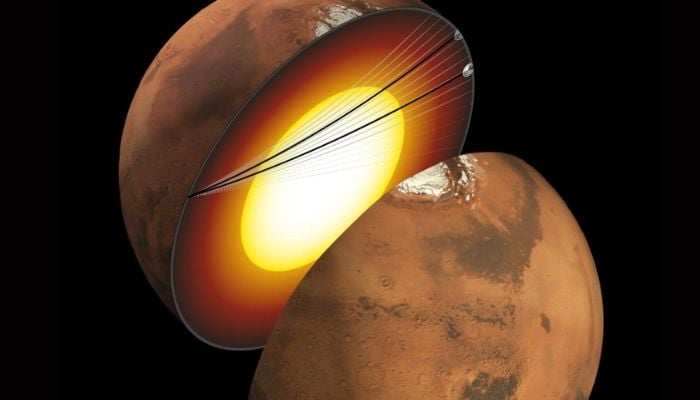First Mars seismic waves uncover liquid core, unleashing new discoveries
Research team tracks seismic data from a Marsquake and a meteor strike
A group of international scientists has made a groundbreaking discovery about Mars. According to a paper published in Proceedings of the National Academy of Sciences, Mars has a completely liquid iron-alloy core with high percentages of sulfur and oxygen.
This core is different from Earth's core, which is a combination of a liquid outer core and a solid inner core. The research team, which included the University of Maryland seismologists, was able to measure Mars' core properties using seismic data from two events detected by Nasa's InSight lander mission.
The team tracked seismic data from a Marsquake and a meteor strike, which revealed the time it took for the seismic waves to travel through Mars.
By comparing the waves that travelled through the core with those that stayed in the mantle, they estimated the density of the planet's core and determined its chemical makeup. This enabled them to conclude that Mars' core is a liquid iron-alloy core containing high percentages of sulfur and oxygen.
The significance of the discovery was explained by UMD Associate Professor of Geology Vedran Lekic. He stated that the properties of a planet's core can provide valuable clues about how the planet was formed and how it has evolved dynamically over time. This discovery provides insights into what is at the centre of Mars and why it is similar to, yet distinct from, Earth.
The research also revealed that Mars' core does not generate a magnetic field, which is essential for protecting a planet from solar winds. This means that the planet's surface conditions are hostile to life. However, traces of magnetism in Mars' crust suggest that it may have had a magnetic field at some point in the past.
This discovery is significant in advancing our understanding of Mars and its evolution over time. It also demonstrates the power of seismic data in uncovering new insights about other planets in our solar system.
-
Scientists discover rare form of 'magnets' that might surprise you
-
Humans may have 33 senses, not 5: New study challenges long-held science
-
Northern Lights: Calm conditions persist amid low space weather activity
-
SpaceX pivots from Mars plans to prioritize 2027 Moon landing
-
Dutch seismologist hints at 'surprise’ quake in coming days
-
SpaceX cleared for NASA Crew-12 launch after Falcon 9 review
-
Is dark matter real? New theory proposes it could be gravity behaving strangely
-
Shanghai Fusion ‘Artificial Sun’ achieves groundbreaking results with plasma control record












